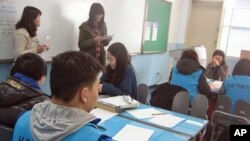During the past decade, tens of thousands of South Korean men have married women from other countries, mostly in Southeast Asia. There is concern now their children will have difficultly fitting into Korean society and the education system. So earlier this month, the government opened up a high school just for them.
Classes began earlier this month at the Seoul Dasom High School for multi-cultural children. Dasom has 48 students who have grown up abroad and have one Korean parent or stepparent.
Liang Man Ni, 18, moved with her Korean mother and Chinese father to Seoul from China in 2009. She said she likes the school a lot and has made friends with students from Japan, Hong Kong and Vietnam.
Learning language and skills
Dasom, which is an old Korean word for love, aims to teach these students the Korean language and also give them training for jobs in the tourism or multimedia industries.
Kim Jee-hye teaches English at Dasom. She said the high school gives an introduction to life in Korea for many of the students here.
"Our goal is to help them adjust themselves to Korean society. They have a lot of difficulties here, not only language difficulties, the difficulty that is based on their different cultural views. We want them to Koreanize in a way," said Kim.
But the Dasom school is not just for students who were raised overseas. Administrators say children born into multicultural families in Korea might need to enroll here, too.
Broadening educational net
That is because many of these kids are not going to school at all. A recent survey found that up to 31 percent of children with a foreign parent stay home and do not learn Korean proficiently.
Seoul National University sociologist Chung Chin-sung, who served on the government panel that created the school, said officials were worried these children will fall through the cracks of society when they get older.
In 2010, children born to parents of mixed heritage counted for about five-percent of all births - about 20,000 out of 470,000 - in South Korea.
And Chung said most South Koreans are not ready for this demographic shift.
"Korea is one of the most homogeneous countries in the world, and we do not have experience to live with other racial people," said Chung.
Chung added that this lack of experience can produce discrimination and racism.
Overcoming cultural hurdles
Many children of mixed marriages say their Korean classmates bully them. Some are teased because their mothers are from Southeast Asian countries that are less developed than South Korea.
Chung said that prejudice is a major reason why these children have a hard time fitting into Korean society.
"Children of these multi-cultural families have the experience to be isolated. Mostly their academic records are very low," said Chung.
Chung said Dasom high school might provide these kids a last chance to learn Korean and not fall behind their piers at mainstream schools. Some advocates worry, though, that segregating these children into their own school will do more harm than good.
Potential negative effects
Ahn Hyun-suk runs a counseling center for multicultural families and children in Seoul, and said the idea of an alternative school for these children can have many negative effects. It gives the image that these children are poor or bad students, yet receive free tuition from the government. This will only hurt their ability to be accepted in Korean society.
Ahn said the best way to teach multi-cultural children is to integrate them in normal Korean schools.
English teacher Kim acknowledged that this type of school is somewhat of an experiment.
"We have to try various forms of education for students from multicultural families. Because we are getting more and more students from other countries, but our education system is not yet ready for them. And, we need to educate our Korean students to have more awareness in cultural diversity," said Kim.
Kim said Dasom might soon be on the move. The school is expecting more students to enroll in the upcoming years and will need a bigger campus to accommodate them all.
News
S. Korean School Caters to Children of Multicultural Families




